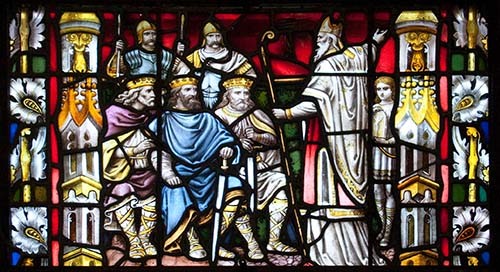
Bottom feature of the center stained glass window in the north transept of Carlow Cathedral of the Assumption, showing St Patrick Preaching to the Kings. Created by Franz Mayer & Co. in the 19th century. Photo via commons.wikimedia.org.
March 16, 2016
The wind and rain weren’t enough to dampen the sounds of bagpipes accompanying festive dancers marching through downtown San Francisco on Saturday during the 165th annual Saint Patrick’s Day Parade and Festival.
The Irish, the more than 70 million world-wide who claim Irish heritage, and the Irish-for-a-day, lifted a pint of Guinness, or something stronger, to toast Saint Patrick, the patron saint of Ireland. Corned beef and cabbage was or will be on many a menu and many were and will be wearin’ the green. Why is it celebrated on March 17? One theory is that is the day St. Patrick died and is now celebrated as his feast day.
The biggest observance of all will be, of course, in Ireland. With the exception of restaurants and pubs, almost all businesses will close on March 17. Being a religious holiday as well, many Irish attend mass, where March 17 is the traditional day for offering prayers for missionaries worldwide before the serious celebrating begins.
Saint Patrick’s Day wouldn’t exist if not for the man himself. Only two authentic letters from him survive from which comes the only universally accepted details of his life. Much of the rest is subject to some debate among scholars.
Patrick is believed to have been born in the late fourth century about 387. He was born at Kilpatrick, near Dumbarton, in Scotland and died at Saul, Downpatrick, Ireland, March 17, 460 (some say 461 or 493). His parents were Calpurnius and Conchessa, who were Romans living in Britain in charge of the colonies. When he was about 14, he was captured in Britain by Irish raiders and taken as a slave to Ireland where Patrick worked as a herdsman, remaining captive for six years before escaping and returning to his family. While captive, Patrick learned the language and practices of the people who held him.
He began his studies for the priesthood and was ordained four years later. Later, Patrick was ordained a bishop and sent to spread the Gospel in Ireland. He arrived in Ireland March 25, 433, at Slane. Patrick began preaching the Gospel throughout Ireland, converting many. He and his disciples preached and converted thousands and began building churches all over the country. Kings, their families, and entire kingdoms converted to Christianity when hearing Patrick’s message. After years of living in poverty, traveling and enduring much suffering, Patrick died March 17, 460. He died at Saul, where he had built the first church.
Interestingly, Patrick was never canonized by the Pope although some disagree . For most of Christianity’s first 1,000 years, canonizations were bestowed on the diocesan or regional level. Relatively soon after very holy people died, the local Church affirmed that they could be liturgically celebrated as saints as was done with Patrick. Nevertheless, various Christian churches declare that he is a Saint in Heaven — he is in the List of Saints — and he is widely venerated in Ireland and elsewhere.
Legend credits Patrick with banishing snakes from Ireland, though evidence suggests that post-glacial Ireland never had snakes. The stories of Saint Patrick and the snakes are likely a metaphor for his bringing Christianity to Ireland and driving out the pagan religions such as the Druids (serpents were a common symbol in many of these religions).
Another legend concerns the shamrock, the national symbol of Ireland. Supposedly, Patrick used the shamrock, a 3-leaved clover, to teach the Irish about the concept of the Trinity, the Christian belief of three divine persons in the one God — the Father, the Son, and the Holy Spirit. The shamrock was sacred to the Druids, so his use of it in explaining the trinity was wise.
If you haven’t already done so, have a toast to Saint Patrick, the patron saint of Ireland.


 The Hunger Site
The Hunger Site
No Comments
Comments for A Toast to Saint Patrick are now closed.